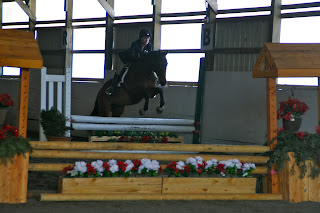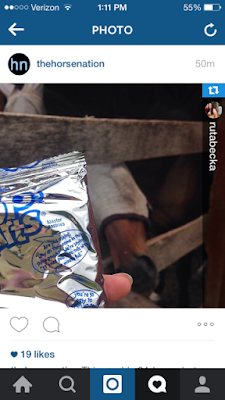 |
| The infamous Elijah himself. |
"Miss Becky! Miss Becky! How do you spell Elijah??"
"E-l-i-j-.."
"Wait! Ok, E. L..."
"I-j-a-h"
"Ok, so it's E-l-i-a-h?"
"You forgot the 'j'. E-l-i-j-a-h."
"Ohhhh, ok."
This is a memory that I, strangely, hold fondly. I was working during summer camp and trying to teach the campers horse colors and markings by using the horses and ponies they rode. In retrospect, maybe Elijah was not the best option for a chestnut, given his difficult to spell name.
 |
| Scout, a yearling the barn somehow acquired. |
I was an animal lover since the day I was born. I suspect my parents thought I would grow out of the horse phase, as most little girls do. I started riding when I was 11 and started working off my lessons before I was a teenager. It was a great barn. We went to local shows, had a great trainer, had a program of sales horses so us barn rats got to ride a lot of different horses and ponies. This was not the type of barn where spoiled kids ran amok. There was no special feeds, no supplements and no injections. We didn't have $5,000 custom saddles. We didn't have custom anything, unless you count
homemade colored ribbon brow bands. We fiercely defended "our" horses colors and no one else was allowed to purchased things (halters, lead ropes, polo wraps, brushes, etc) in those colors. Mine were red and yellow, in case anyone was wondering, and I still have several red and yellow things to this day.
 |
| Oscar, the pony I leased for 4 years. Yes, he jumps at least this well over EVERY. SINGLE. FENCE. |
I took all of this for granted. I didn't really know any different. The horses lived outside. We had stalls, technically, but we only used them for emergencies or for tacking up.We didn't have a wash stall so we trained our horses to stand the heck still when bathing. The footing in the ring was sand. It only got dragged a handful of times a year. The horses were almost all barefoot. If they did have shoes, it was regular steel shoes and only up front. We only had dressage letters because I made them with a fellow barn rat one summer. We did a lot of things that I definitely wouldn't let any of the children I taught lessons to ever do. (We free jumped in an outdoor, we made our own cross country jumps out of basically anything we could, we used to race each other on horse back around the fields.) We asked our horses to do "dressage" one day, wear a costume the next, get around a 2'6" hunter course the next and give a lesson to a young kid on the fourth day. Generally speaking, the horses and ponies did everything we asked.
 |
| Dakota. He cribbed so badly, even with a collar, that he had 1/8" nubs for teeth. |
Colic was rare, even after a pony escaped and was working on eating an entire bag of grain when we found him. Choking was rare, only once I can remember in all the years. Injuries were rare and usually not life threatening. The horses were SOUND. The horses were fed sweet feed out of buckets on the fence line so the boss horses ate more than the less aggressive ones. We made sure they all were an appropriate weight. Did we have horses who spooked, reared, bucked, ran us over, didn't clip, wouldn't load? Absolutely. But for the most part, the horses were easy and happy. They were at a barn that made sure they were fed, lived outside 24/7 with other horse friends and enjoyed their turnout sheds, were warm and dry in the winter under their blankets, were fly sprayed (with
Bronco! As if we'd use anything else!!) in the summer, and they always had clean water. Not a bad gig for a horse.
 |
| Rosy, a through and through stereotypical chestnut TB mare who for some reason I absolutely adored. |
Where am I going with this, you might be wondering. The point is eventually I went to college and learned that that isn't how most barns are run. I learned about nutrition, not feeding sweet feed, that corn oil isn't actually good for horses. I learned how to wrap far more than polo wraps. I learned about IRAP, Tildren, PRP, IM Adequan versus IV Legend (and how to give those shots myself), Polyglycan, joint injections, shockwave therapy. I learned about the barefoot versus shoes versus boots arguement. I learned that a lot of horses live in stalls with minimal/no turnout. Some turnout fields don't have sheds and the horses only go out in perfect weather. I learned that the Oscar pony (who was unbiasedly the best hunter pony over the jumps that we had so it was always a special occasion when a younger kid was allowed to ride him because he was a bit spooky and would run away with you on occasion but he was allergic to touching those rails and that made him pretty darn cool) I had leased for many years was in fact, NOT a fancy pony. Sure, his jump will beat the pants off of just about anything but that's where the buck ends. Jumping the roll top was not actually a big deal like I had thought when I was a kid. A 2'9"-3' jump course is tiny. Full chaps aren't common place in the hunter world. You are expected to own a pair of well fitting tall boots after the age of 14. A lot of people don't braid their own horses for shows. Some people don't know how to clip their own horses. Horses aren't all "mutts" who have no known pedigrees who were purchased because they looked like solid citizens.
 |
| Simon! One of the sweetest horses you'll ever meet. |
Over the years working in the equine industry, I learned all about the fancy, well broke, royally bred horses and ponies. I learned that some people pay six figures for them. I can safely say I think the barn never paid more than $5,000 for a single horse I rode as a child. I learned about all the big shows, the popular apparel, the obscene amount of money that horses actually cost. I learned more than I ever hoped to learn about diseases, lamenesses and treatments for those diseases and lamenesses. I can give a IV shot on the first try to a colicking horse after drinking several Mike's Hard Margaritas. (Ask me how I know this...) I can spot a lameness with the best of them. I try my best to keep up to date on all the new technology, both in apparel (WHERE WERE TECHNICAL FABRICS WHEN I WAS A KID?!) and in the rest of the horse world. I learned that horse people don't make any money, unless you're a vet or a farrier. I learned that a good vet and a good farrier are worth every penny you give them.
 |
| Romeo, a lesson pony. |
I learned that finding a barn who will text you when your horse pulled a shoe, is good about getting the horses outside or has a 24/7 turnout situation, has good fencing, feeds a high quality feed, will make sure your horse either has hay or grass in front of him all the time, and generally cares about each and every horse like it's their own is few and far between. Sometimes the board costs $350 a month, sometimes it costs over a grand. They exist for sure but mostly, it's like chasing a unicorn. I grew up surrounded by people who gave a shit. I didn't realize that people who ran barns, or trained, or gave lessons could be any other way. I grew up around fellow barn rats, and a wonderful trainer, who all cared and tried their very best on our no pedigree "mutt's." Yes, we would sometimes get beat in the show ring by the girls on their fancy, expensive horses who just sat there and didn't train their horse themselves. But, now, as an adult, I wonder, who's the real winner here?
 |
| Me, probably in summer 2000?, riding Noel, a Friesian mare. |
I was talking to the girl who cleans the stalls at Digby's barn the other day, which is what got me thinking about all this stuff in the first place. We were talking about the advantages of small hole hay nets, how turnout is important, how we wished a local college turned their horses out more but understood why they couldn't. The lone pitchfork of the barn has a broken tine now so we were talking about how it's cheaper to just buy the head of a pitchfork, rather than buy an entire new one, and it's easy to just unscrew the old one and put the new one on. She didn't know you could do that and it hit me at that moment the massive amount of things I've learned while working with horses for 15+ years now, both from the horses and from other people, and the massive amount of things I still don't know.
 |
| Hattie, a lesson pony who eventually got laminitis but did fine when kept on Isox. It was really the only "illness" my childhood barn ever dealt with. |
When I used to teach riding lessons, I'd commiserate with parents who lamented about the expense of riding lessons. There aren't many barn programs in my area who allow children to work off lessons anymore, due to insurance reasons I suspect, and as we all know, it's an expensive sport. Lessons and local shows alone are hundreds of dollars a month. Let alone if you want to buy your own tack, equipment, apparel, buy or lease a horse/pony, show in rated shows, pay a braider, etc. Holy heck, does the expense add up. I know because I'm an adult and have those bills myself. I always told parents that yes it's expensive but it was the best thing they could do for their child. They will learn life skills here that are hard to come by. They will learn things the hard way. They will never forget this and will make friends for life. I don't teach anymore but I still stand by that statement.
 |
| Basil (and part of Felix's head), at a show. |
I am forever thankful I grew up at the barn I did. I am thankful for every rotten, bad sales pony I sat on and that I grew up when I could work off lessons. I couldn't of asked for a better start to the horse world and to life. Do I sometimes wish I went to the big shows, had a fancy and sound horse? Absolutely. Do I wish I was an even better rider? Ugh, don't we all. Do I wish I knew more or could help my horse more with his lameness issues? Yup. But my childhood barn life of not owning my own horse, riding the sale ponies, sweating, bleeding, keeping a running tally every summer of how many green head flies we could kill, and working for everything I got has shaped me and made me into the adult I am today. I wouldn't change that for the world.
 |
| Jazz, a saint of a lesson horse. |
So, tell me, teach me, show me, fellow horse lovers and bloggers - what have you learned from your horse? What are you thankful for? What do you hope to learn in the future?













































